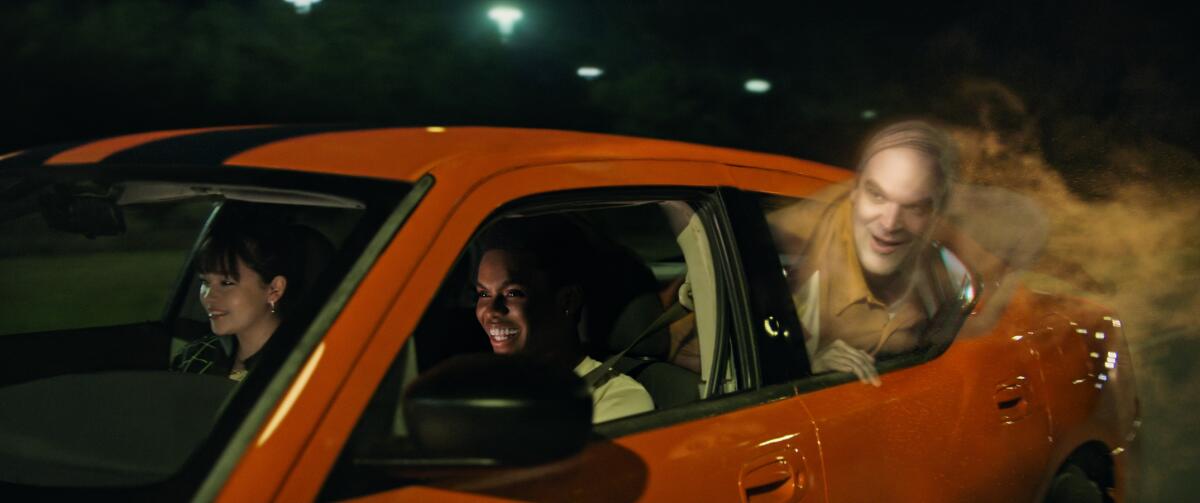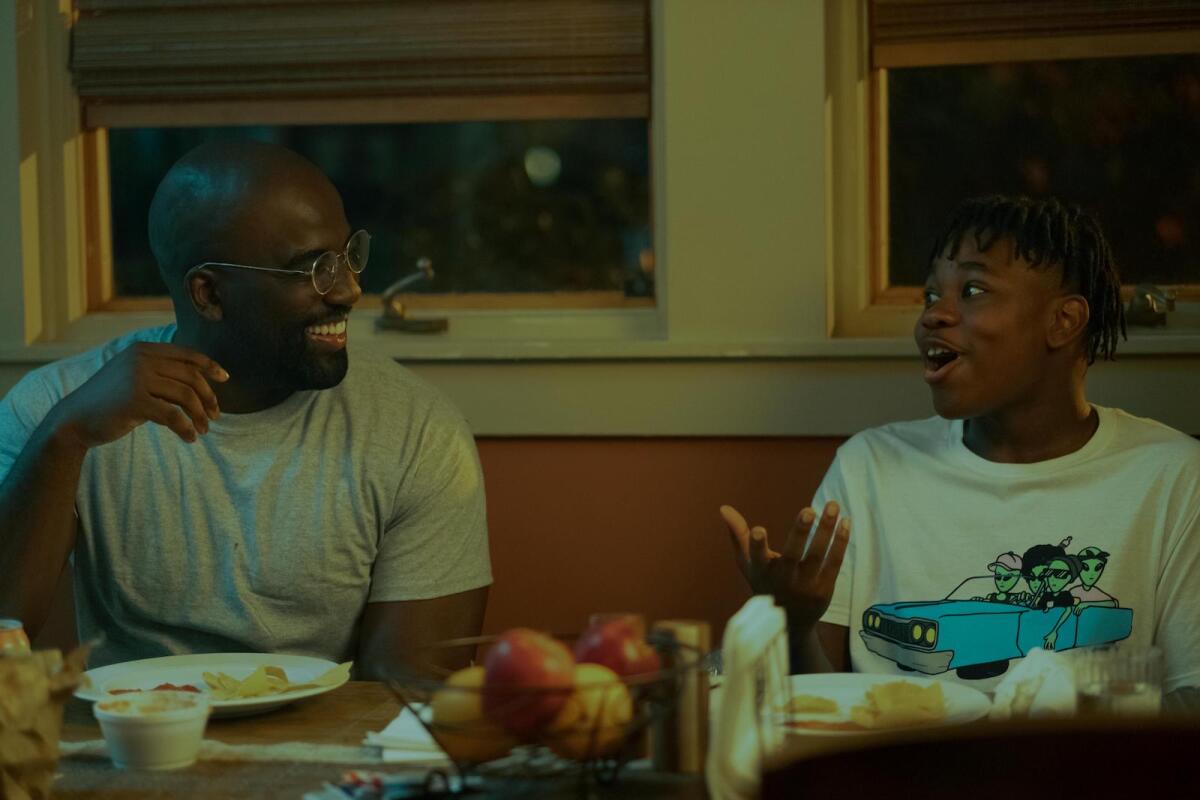Review: David Harbour is one lovable dead guy in ‘We Have a Ghost’; plus the artful ‘Bruiser’

‘We Have a Ghost’
Based on Geoff Manaugh’s short story “Ernest,” the genial horror-comedy “We Have a Ghost” stars David Harbour as a spirit haunting a fixer-upper house in the Chicago area. Dubbed “Ernest” because of the name stitched on his shirt, the ghost — who can make noise but can’t talk, and can touch people but can’t be touched — tries to chase away the home’s new family by howling and making scary faces. But introverted teenager Kevin (Jahi Winston) can tell Ernest is no threat and becomes his friend, while Kevin’s clout-chasing dad, Frank (Anthony Mackie), turns the apparition into a viral sensation.
Writer-director Christopher Landon adapted Manaugh’s story, adding a few more characters and twists while holding on to a lot of the original premise. Landon is best known for “Happy Death Day” and “Freaky,” two polished, genre-bending films that combine humor, horror and surprising swells of emotion. In this case, most of the heart-tugging comes via Kevin, from his strained relationship with Frank and his attempt to help Ernest figure out who he really is.
“We Have a Ghost” is unnecessarily long, padded with tangential comic characters — including Jennifer Coolidge as a phony TV spiritualist and Tig Notaro as a bitter ex-CIA agent — who don’t do a lot to advance the story or make it funnier. But there are several impressively dynamic special effects sequences with Ernest using his ghost powers to protect Kevin. And Landon gets a lot of help from Harbour, whose facial expressions alone capture this ghost’s wit, hopes, fears and heartbreak. He’s one lovable dead guy.
“We Have a Ghost.’’ PG-13 for language, some sexual/suggestive references and violence. 2 hours, 6 minutes. Available on Netflix; also playing theatrically, Bay Theater, Pacific Palisades.

‘Bruiser’
The artful indie drama “Bruiser” starts out as an engaging but perhaps too typical coming-of-age story about a middle-class kid cracking under the pressure of having to be a diligent and well-behaved student all the time. Then about a third of the way through the film, director Miles Warren (who also co-wrote the film with Ben Medina) introduces a twist that effectively alters the audience’s understanding of who this young man is and how he was raised.
Jalyn Hall plays Darious, a teenager whose parents have saved and sacrificed to send him to a nice boarding school, providing the kind of comfortable upbringing they didn’t have. When he gets bullied and beaten up, Darious weighs two competing visions for his future as a man: one represented by his father Malcolm (Shamier Anderson), a hardworking businessman who favors discipline, and one promoted by his new acquaintance Porter (Trevante Rhodes), a muscular rambler who teaches the kid how to assert himself.
Warren keeps this story simple, leaving room for long conversations that capture the nuances of these three personalities — often staged in striking, softly lighted locations, like a scenic creekside or a carnival. But what makes “Bruiser” so affecting is that Warren doesn’t keep any of these characters locked into types. If this gently philosophical film has a lesson for Darious — and for us — it’s that life is long and things change. The choices made yesterday don’t always have to define who we are today.
“Bruiser.’”Not rated. 1 hour, 37 minutes. Available on Hulu.
‘Devil’s Peak’
In the Appalachian crime drama “Devil’s Peak,” a North Carolina meth kingpin named Charlie — played with entertaining gusto by Billy Bob Thornton — educates his crew by sharing colorful anecdotes from his misspent youth, filled with rich details about both the fun and the responsibilities of being a bad guy. These stories are delivered in Thornton’s affable drawl, as though they just popped into the actor’s head. And unfortunately, they’re usually livelier than the dour movie surrounding them.
It’d be hard for anyone to compete with Thornton, but “Devil’s Peak” isn’t helped much by the bland performance of its lead, Hopper Penn, who plays Charlie’s softhearted son Jacob. Robert Knott’s screenplay (adapted from David Joy’s novel “Where All Light Tends to Go”) and Ben Young’s direction puts Penn’s Jacob in reactive mode most of the time, overshadowed by his charismatic father, his drug-addicted mother (played by Penn’s real-life mom, Robin Wright), and his socially well-connected girlfriend, Maggie (Katelyn Nacon).
The film does kick into gear in its final third, when Jacob starts challenging the authority figures in his life: from Charlie, whose lawbreaking is increasingly brazen, to Maggie’s father (Brian d’Arcy James), a rising local power-player hoping to build his political career by taking down Jacob’s family. The elements of a good, “Winter’s Bone”-like depiction of the rural social order are here. But they only really coalesce — and combust — when Thornton’s on the screen.
“Devil’s Peak.” Not rated. 1 hour, 37 minutes. Available on VOD; also playing theatrically, Laemmle Glendale.
‘Ambush’
The big surprise attack in the middling Vietnam War thriller “Ambush” occurs early in the film when an enemy squadron invades a remote camp of U.S. soldiers and engineers, stealing a binder containing high-level military intelligence. At a base a safe distance away, Gen. Drummond (Aaron Eckhart) orders two of his toughest underlings — a special forces officer named Mora (Gregory Sims) and a dogged tracker named Miller (Jonathan Rhys Meyers) — to retrieve the binder at all costs, even if they lose every one of the small handful of frontline grunts and underprepared eggheads at their command.
The real star of “Ambush” is Connor Paolo, playing Cpl. Ackerman, one of those college-educated “ditch-diggers” Mora thinks is useless. Miller, though, sees value in Ackerman’s drafting skills and sends him into the Viet Cong tunnels to draw a map. The bulk of the movie takes place underground, while the cast’s bigger names appear only occasionally, in scenes where they mostly stay in one location and talk. This is a dialogue-heavy movie in general, with lots of conversations about what people are going to do — or accusations that they’re not good enough to get it done. “Ambush” has the structure of an old-fashioned two-fisted combat picture, but with too little actual combat.
“Ambush.’” R, for violence, some bloody images, and language. 1 hour, 44 minutes. Available on VOD.
‘The Outwaters’
During the found-footage horror boom, the films started out looking mostly realistic before gradually becoming more scripted and “performed.” Writer-director Robbie Banfitch’s intensely freaky “The Outwaters” gets the genre back to its unpolished roots — and, as a result, will require some patience from thrill-seekers expecting a more conventional B-movie. Banfitch stars as Robbie, an aspiring filmmaker who ventures into the Mojave Desert with his brother Scott (Scott Schamell) and friend Ange (Angela Basolis) to shoot a video for folkie singer-songwriter Michelle (Michelle May). “The Outwaters” begins with lots of loose footage of young folks hanging out.
Then in the second half — after our heroes start hearing loud booms in the distance and see the ground invaded by enormous, shrieking, blood-letting worm-creatures — Banfitch pivots to unbridled chaos as Robbie records his descent into an inexplicable nightmare. Some may find all this tedious or confusing, but there’s an admirable integrity to Banfitch’s approach. “The Outwaters” genuinely feels like a first-person perspective on the end of the world.
“The Outwaters.” Not rated. 1 hour, 50 minutes. Available on Screambox; also playing theatrically, Lumiere Music Hall, Beverly Hills, Feb. 24 only.
‘God’s Time’
Daniel Antebi’s debut feature, “God’s Time,” is a restless film about restless characters. Ben Groh plays the movie’s fourth-wall-breaking narrator, an energetic recovering addict who ropes Luca (Dion Costelloe), his best friend from meetings, into trying to save their mutual acquaintance Regina (Liz Caribel Sierra), who they believe is planning to murder her ex. While chasing Regina across New York City — in the COVID-affected fall of 2020, no less — the two pals keep stumbling into hectic and sometimes violent situations, and inadvertently make Regina’s life worse with their inquiries into where she is and how she’s doing. “God’s Time” has an endearingly scrappy vibe and a talented cast filled with unfamiliar faces. But it also feels cobbled together, as though Antebi had multiple ideas for how to approach this material — goofy comedy? earnest melodrama? urban thriller? stylish meta-movie? — and decided to shoot a few scenes in each mode. The individual pieces mostly work, but they don’t quite fit together.
“God’s Time.” Not rated. 1 hour, 23 minutes. Available on VOD; also playing theatrically, Laemmle Glendale.
Also streaming

“M3GAN” is already one of 2023’s surprise box office hits thanks to a hooky story — about a life-size robot doll that turns violent to protect her owner — and a winning lead performance from Allison Williams as the killer toy’s creator. Even the millions of people who went to see the movie in theaters may want to check out its streaming premiere, which offers an unrated version that’s reportedly much gorier. Available on Peacock.
“EO” is a late-career masterpiece from Polish filmmaker Jerzy Skolimowski, who has been directing prize-winning movies since the 1960s. His Oscar-nominated latest is the mostly dialogue-free story of a donkey that gets passed from owner to owner and predicament to predicament in vignettes that Skolimowski captures with wit, humanity and astonishing visual flair. Available on the Criterion Channel.
Available now on DVD and Blu-ray
“A Life’s Work” tells four fascinating stories about folks who’ve dedicated their careers to projects they know won’t be finished when they retire — or even when they die. Documentarian David Licata puts a spotlight on people devoted to preserving the past or building for the future, plugging away at making the world better regardless of personal glory. First Run Features (also available on VOD)
More to Read
Only good movies
Get the Indie Focus newsletter, Mark Olsen's weekly guide to the world of cinema.
You may occasionally receive promotional content from the Los Angeles Times.










